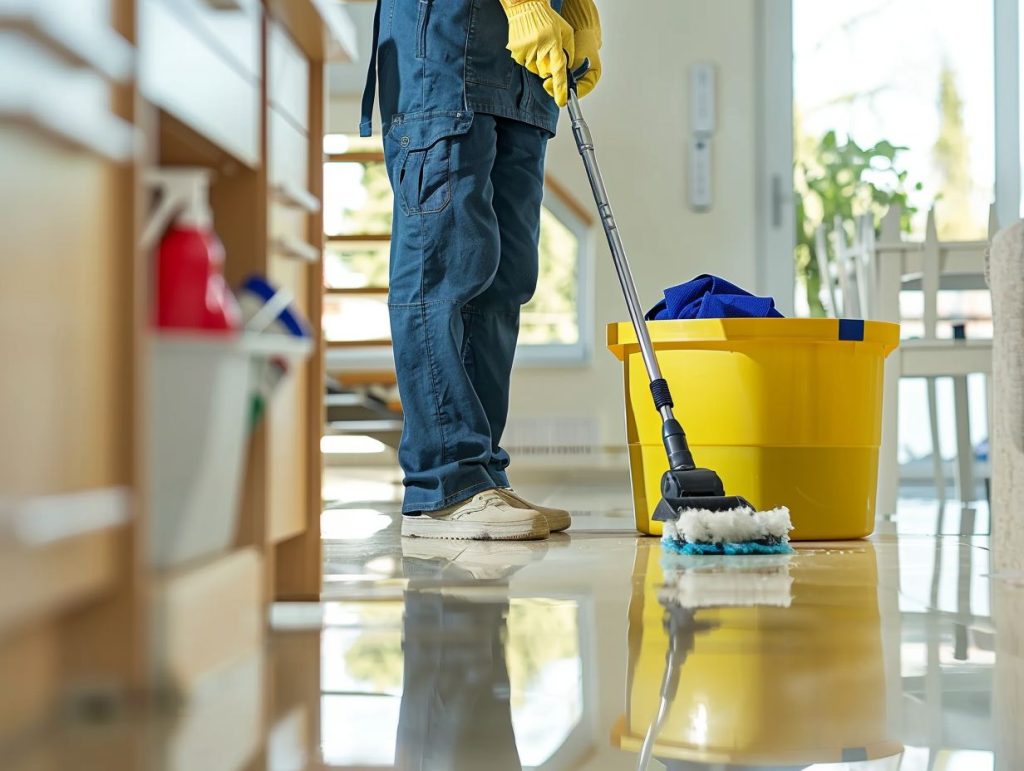You’re knackered. Properly done in. It’s nearly spring, your flat looks like a crime scene from a particularly lazy episode of Come Dine With Me, and you’ve somehow got exactly 48 hours to sort it before your mum visits, your landlord inspects, or you simply can’t bear living in your own filth anymore. The duvet’s calling, Netflix is waiting, but that sticky patch on the kitchen floor has developed sentience and you’re fairly certain something’s growing in the fridge that wasn’t there when you moved in.
Here’s the thing – I’ve been cleaning London flats professionally for over a decade, and I’ve taught hundreds of people at my academy in Forest Hill. I know exactly what you’re up against. You’re not looking for perfection. You’re looking for “noticeably better” with minimal energy expenditure. That’s not lazy – that’s smart. Let me show you how to transform your flat in one weekend without actually dying in the process.
The Brutal Honesty You Need Before You Start
Your Flat Won’t Look Like Those Bloody Pinterest Boards
Right, let’s get this out of the way immediately – those Instagram cleaning accounts with their perfect homes and their colour-coordinated bottles? They’re either professional organisers with eight hours a day, or they’re lying. Your London flat, cleaned over one weekend whilst running on fumes and questionable coffee, will not look like that. And that’s absolutely fine.
What you’re doing is spring cleaning, not a deep clean. There’s a difference. A proper deep clean of a two-bed flat takes a professional team about 6-8 hours. You’ve got one weekend and the energy reserves of a particularly exhausted sloth. We’re aiming for “significantly improved” and “won’t embarrass you in front of guests.” That’s a perfectly respectable goal.
The 80/20 Rule Will Save Your Sanity
This is possibly the most important thing I’ll tell you – 20% of your effort creates 80% of the visible impact. In cleaning terms, this means certain areas of your flat contribute massively to the overall impression of cleanliness, whilst others barely register.
In a London flat, your high-impact zones are: kitchen surfaces, the bathroom sink and loo, your living room coffee table, and anywhere guests can see from the doorway. Get these sorted and your flat will feel transformed, even if the inside of your wardrobe still looks like a Primark exploded. This isn’t about being thorough – it’s about being strategic when you’re running on empty.
Friday Evening: Don’t Skip the Boring Bit
Your 30-Minute Strategy Session
I know you want to dive straight in with the Marigolds and the Zoflora, but trust me – half an hour of planning will save you three hours of aimless faff. Pour yourself something nice (I won’t judge if it’s wine at 6pm on a Friday), grab a notepad, and walk through your flat like you’re a moderately judgemental estate agent.
Note down the absolute horror shows – the bathroom grouting that’s gone from white to “dystopian grey,” the cooker that’s seen better decades, the mysterious stains. Then, and this is crucial, be realistic about what you can actually achieve. You’re creating a battle plan, not a fantasy novel. Two full days sounds like loads of time until you remember you’re essentially operating on spite and caffeine.
Break it into chunks: Saturday morning, Saturday afternoon, Sunday morning, Sunday afternoon. Each chunk gets specific rooms or tasks. Write it down. Stick it on the fridge. This is your map through the wilderness of your own neglect.
Gather Your Weapons (And Maybe Some Wine)
You don’t need seventeen specialist products. You need five things that actually work: a good multi-surface cleaner, bathroom cleaner, something for limescale (crucial in London), microfibre cloths, and bin bags. Lots of bin bags.
If you’re shopping at your local Sainsbury’s Local at 7pm on Friday because you’ve left it to the last minute (no judgement – we’ve all been there), get the own-brand stuff. It works. The fancy bottles with the aesthetic labels and the price tag of a small car are lovely, but you’re not filming content here, you’re trying to make your flat habitable. Save the money for the takeaway you’ll inevitably order on Saturday night when you can’t face cooking.
Saturday: Kitchen and Bathroom Blitz
Why These Two Rooms Are Your Only Priority Today
Listen, I’m about to save you hours of wasted effort. Today – all of Saturday – is exclusively for your kitchen and bathroom. Not the bedroom. Not the living room. Just these two spaces.
Why? Because cleanliness is as much psychological as practical. A sparkling kitchen and bathroom make your entire flat feel cleaner, even if your bedroom still looks like you’re cosplaying as a teenager. These are also the rooms where hygiene actually matters – you’re preparing food and washing yourself here, so they need proper attention.
Plus, they’re the hardest rooms to clean, so getting them done first means Sunday feels like a victory lap rather than a death march.
The Kitchen: A Crime Scene Investigation
Start with the fridge. Yes, really. Empty it completely, chuck anything that’s achieved sentience or expired during the last government, and wipe down every shelf with warm soapy water. It’ll take 20 minutes and you’ll feel like you’ve accomplished something major, which gives you momentum.
Next up: the cooker. This is where you’ll earn your stripes. If you’ve got a gas hob, remove the grates and soak them in hot water with washing up liquid whilst you tackle the actual cooker top. Use a degreaser – our London air is filthy and it combines with cooking grease to create something that could probably survive a nuclear winter. Work systematically from the back to the front, and don’t forget the knobs (everyone forgets the knobs).
For surfaces, work top to bottom and left to right. This prevents you from re-cleaning areas you’ve already done, which is incredibly demoralising when you’re running on fumes. Clear everything off your counters – yes, everything – clean the surfaces properly, then only put back what you actually use. That spiralizer you bought in 2019 and used once can go in a cupboard.
The sink deserves special attention because it’s what people notice. A shiny sink makes the whole kitchen look better. Use your bathroom cleaner here if you need to – it’s brilliant for stainless steel.
The Bathroom: Your Afternoon Project
The secret to bathroom cleaning when you’re exhausted is the “spray and walk away” method. Start by spraying literally everything – toilet, sink, bath, tiles – with appropriate cleaners. Then leave for 15 minutes whilst you have a cup of tea and question your life choices. The products do the work whilst you rest. Genius.
When you return, start with the toilet because once that’s done, everything else feels easier. Scrub, flush, wipe down the seat and outside. Make it sparkle. You’re going to feel disproportionately proud of this achievement.
The sink and taps are next. London water is basically liquid chalk, so you’re battling limescale as well as general grime. A limescale remover is non-negotiable here – don’t try to be a hero and scrub it off manually, you’ll be there until Tuesday. Spray, wait, wipe, admire.
The shower or bath is your final boss battle. If you’ve got serious limescale or soap scum, you might need to spray, walk away for 30 minutes, then scrub. Use an old toothbrush for the grout and the corners where gunk accumulates. It’s tedious, but the transformation is worth it.
Sunday: Making the Rest Look Respectable
Bedroom and Living Room: The Visible Victories
Sunday is when you start to feel human again, mainly because the hard work is done. Your bedroom doesn’t need a deep clean – it needs fresh bedding and a proper tidy. Strip the bed, wash everything, and whilst it’s in the machine, tackle the floor-drobe.
Seriously, just pick up all the clothes. Every single item. Sort them: clean things get folded or hung, dirty things go in the wash. This alone will transform your bedroom from “depression nest” to “functioning adult space.” Wipe down surfaces, open the windows for 20 minutes even though it’s freezing, and make the bed properly with those fresh sheets. Instant serotonin boost.
The living room is all about surfaces and soft furnishings. Clear the coffee table, wipe it down, plump the cushions, fold the throw that’s been living on the floor for three weeks. If you’ve got a sofa that’s looking tired, give it a quick hoover with the upholstery attachment – you’ll be horrified by what comes up, but it makes a massive difference.
Floors, Windows, and the Finishing Touches
Floors get dirty in London at a rate that defies physics – it’s the pollution, the constant building works, and the general grime of city living. You don’t need to hand-wash them on your knees like a Victorian servant. A decent hoover or sweep followed by a quick mop of hard floors is sufficient.
Focus on the edges and corners where dust accumulates and is actually visible. The middle of the room can be slightly less pristine – no one’s going to notice. This is about impact, remember?
Windows in London are a losing battle, but you can improve them. A spray bottle with water and a tiny bit of washing up liquid, plus a microfibre cloth, works wonders. Do the insides only – you’re not climbing out onto a ledge – and focus on removing the worst of the grime. Streak-free perfection is for people who aren’t exhausted.
Final touches: empty all the bins, light a nice candle or use some air freshener, and do a final walkthrough removing any random clutter you’ve missed. Stand in your doorway and look at what you’ve achieved. It’s not perfect, but it’s noticeably, significantly better.
Survival Tactics From the Trenches
The Psychological Game
Cleaning when you’re exhausted is 80% mental warfare. You need good audio content – either a podcast that makes you laugh, an audiobook you’re invested in, or a playlist of absolute bangers that make you move faster. I’m talking your guilty pleasures, the songs you belt out in the car when no one’s listening.
Use the Pomodoro Technique: 25 minutes of work, 5 minutes of rest. Set a timer. When it goes off, stop and have a proper break. Sit down. Drink something. Check your phone. This prevents burnout and makes the whole thing feel manageable rather than like a forced march.
Treat yourself strategically. Finished the kitchen? Have some chocolate. Bathroom done? Order that takeaway. Your brain needs rewards to keep going when your body is staging a mutiny.
When to Admit Defeat (And Why That’s Fine)
Sometimes, you need to call in professionals. If you’re staring at your flat on Friday evening and feeling actual despair rather than just mild dread, it might be worth getting help. A professional cleaner can do in three hours what’ll take you all weekend, and sometimes your energy is better spent working to earn money for a cleaner than destroying yourself trying to scrub grouting.
I run a cleaning academy, I’ve trained hundreds of professional cleaners, and you want to know a secret? Even we hire other cleaners sometimes. When I moved house last year, I absolutely paid someone else to clean my old flat. No shame whatsoever. Knowing when to outsource isn’t failure – it’s resource management.
You’ve Got This
Your flat won’t be perfect. It doesn’t need to be. What it will be is noticeably, significantly cleaner – clean enough that you can breathe easier, invite someone over without panic, or simply exist in your space without that low-level anxiety that comes from living in chaos.
Spring cleaning isn’t a one-time nuclear option – it’s about getting things to a manageable baseline that you can then maintain with much less effort. Twenty minutes a day keeps the disaster at bay far better than one exhausted weekend every six months.
Now go put the kettle on. You’ve earned it.

